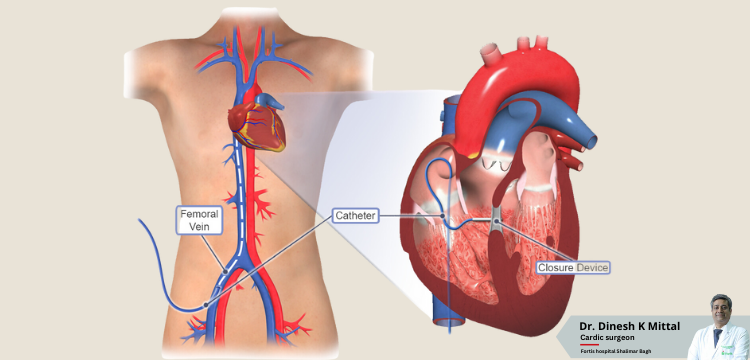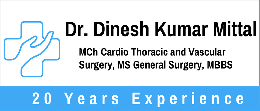Is Adult VSD Closure a Viable Solution for Heart Problems?

Ventricular Septal Defects (VSDs) are common heart issues in adults, involving abnormal openings between the heart’s chambers. These defects affect the heart’s ability to function correctly by disrupting blood flow. Globally, thousands of adults live with VSDs, impacting their heart health and overall well-being.
These heart problems can lead to complications such as fatigue, shortness of breath, or heart failure if left untreated. However, there’s hope! Doctors can fix these defects through a procedure known as Adult VSD Closure. This treatment aims to mend the abnormal openings in the heart, allowing it to work better and reducing the risk of severe heart issues.
Dr. Mittal states, “The VSD closure procedure in adults has shown remarkable effectiveness in enhancing heart function. It significantly reduces strain on the heart and prevents potential complications. The advancements in techniques have notably improved outcomes, offering a promising solution for adult patients with VSDs, ensuring better heart health and improved quality of life.”
Also, the success rate of Adult VSD Closure is quite promising, often resulting in improved heart function and fewer complications. This blog delves deeper into this procedure, exploring how effectively it addresses heart problems in adults with VSDs. We’ll investigate its benefits, potential risks, and role in enhancing the heart’s health, providing valuable insights into whether Adult VSD Closure is a reliable solution for heart-related concerns in adults.
What Is Adult VSD?
Adult Ventricular Septal Defects (VSDs) are heart conditions characterized by abnormal openings between the heart’s chambers. These defects, present from birth, might go undetected until adulthood or persist from childhood without treatment. Common causes include incomplete closure of the septum during fetal development or complications arising from heart surgery.
What are the Symptoms and Complications?
Common Symptoms: Some adults with VSDs may remain asymptomatic for years. Symptoms, if present, may include shortness of breath, fatigue, heart murmurs, or an irregular heartbeat.
Complications: Untreated Adult VSDs can lead to heart enlargement, pulmonary hypertension (high blood pressure in the lungs), heart failure, and an increased risk of infective endocarditis (an infection of the heart’s inner lining).
What is its Impact on Heart Function and Overall Health?
Heart Function: VSDs affect the heart’s efficiency. They create an abnormal pathway for blood flow, causing an overload of blood in the right side of the heart, leading to strain on the heart muscles and potentially weakening the heart over time.
Overall Health: The strain on the heart due to VSDs can lead to decreased exercise tolerance, increased susceptibility to respiratory infections, and a reduced quality of life if left untreated. Over time, it might also lead to severe complications affecting daily activities.
What are the Causes of Adult VSDs?
Adult VSDs typically result from the incomplete closure of the septum (the heart wall separating the chambers) during fetal development. Other causes might include complications from previous heart surgeries or conditions that weaken the heart muscles, such as myocardial infarction (heart attack) or endocarditis.
Understanding these aspects of Adult VSDs is crucial to recognizing the potential impact of these defects on heart health and overall well-being in adults. Seeking medical attention for appropriate diagnosis and treatment is essential to manage and address these conditions effectively.
What is the Role of VSD Closure in Adults?
The function of VSD closure in adults includes the following aspects:
- Restoring Normal Blood Flow: Closure of VSDs aims to repair the abnormal opening between the heart chambers, allowing blood to flow properly within the heart. This normalization prevents the overloading of blood in specific heart compartments.
- Reducing Strain on the Heart: Closure diminishes the burden on the heart, alleviating strain caused by the excess blood flow between chambers. This lessens the workload on the heart muscles.
- Preventing Complications: By closing the VSD, the risk of developing complications like heart failure, pulmonary hypertension, and infective endocarditis significantly decreases.
What Role Does VSD Closure Play in Improving Heart Health?
- VSD Closure (Ventricular Septal Defect Closure): This surgical procedure aims to repair a hole in the wall separating the heart’s lower chambers (ventricles).
- Improves Heart Function: Closure helps prevent excessive blood flow between the ventricles, reducing strain on the heart.
- Enhanced Circulation: It promotes better circulation, preventing the heart from overworking and decreasing the risk of complications.
- Minimizes Heart Failure Risks: By closing the hole, VSD closure reduces the likelihood of heart failure and related issues.
- Improves Quality of Life: Successful closure often enhances overall health, stamina, and physical activity capacity.
- Prevents Long-term Complications: Closing VSDs early in life prevents potential complications like infections, heart rhythm abnormalities, and pulmonary hypertension.
- Reduces Future Heart-related Surgeries: Timely VSD closure may prevent the need for future heart surgeries or interventions, ensuring a healthier heart for the long term.
How Effective is the VSD Closure Procedure for Adults?
The effectiveness of VSD closure procedures in adults is evident through various factors:
a) Success Rates: Medical research and clinical data indicate high success rates for VSD closure in adults, with many procedures leading to successful outcomes.
b) Improved Heart Function: Closure procedures aim to restore normal blood flow and reduce the strain on the heart. Post-closure, many adults experience enhanced heart function, enabling better pumping efficiency and improved circulation.
c) Positive Outcomes: Case studies illustrate positive outcomes following VSD closure, showcasing reduced symptoms, improved exercise tolerance, and minimized risk of complications.
d) Medical Evidence: Numerous medical studies highlight the benefits of VSD closure in adults, emphasizing its role in stabilizing heart conditions and improving overall cardiac health.
What are the Procedures and Techniques of VSD Closure?
In treating Adult Ventricular Septal Defects (VSDs), various techniques and procedures are employed to close the abnormal openings in the heart:
- Surgical Closure: Traditional open-heart surgery involves making an incision in the chest to access the heart. Surgeons then use patches or stitches to close the VSD.
- Transcatheter Closure: A minimally invasive procedure where a catheter is guided through blood vessels to the heart. Using imaging techniques, the surgeon places a closure device to seal the defect without needing open-heart surgery.
- Advancements in Technology: Innovations like 3D imaging, catheter-based interventions, and improved closure devices have revolutionized VSD closure. These advancements enable more precise diagnosis, planning, and execution of procedures, leading to enhanced outcomes.
- Hybrid Procedures: In some complex cases, surgical and catheter-based approaches may be utilized for optimal closure, depending on the VSD’s size, location, and the patient’s overall health.
These evolving techniques offer safer, more effective, and minimally invasive alternatives, significantly reducing recovery time and post-operative complications.
Dr. Dinesh Kumar Mittal, specializing in Ventricular Septal Defects (VSD), has performed over 7,000 cardiac operations on adults and children. His significant experience demonstrates his expertise in delivering specialized care for heart diseases, assuring individualized treatment, and delivering cardiac solutions.
Priyanka Dawar stated, “Dr. Dinesh Kumar Mittal’s team performed two successful surgeries on my father in March 2022, saving his life. Under Dr. Mittal’s guidance, everything was organized for recovery. His calm, knowledgeable, and humble nature made post-surgery consultations easy. He emphasizes minimal medication and focuses on recovery through diet and exercise. His composed demeanor and great work deserve all success, health, and happiness.”
What is the Cost of Adult VSD Closure in India?
The cost of Adult VSD Closure in India can range from approximately Rs. 2,00,000 to Rs. 6,00,000 or more (approx. USD 5000), depending on factors like the hospital, surgeon’s expertise, procedure type, and necessary post-operative care.
However, it’s important to note that these figures may vary significantly. Additional expenses such as diagnostic tests, medications, and hospital stays contribute to the final cost. Patients should consult their healthcare provider for a more accurate estimation based on their specific case and the hospital’s pricing policies.
Conclusion
Adult Ventricular Septal Defects (VSDs) significantly impact heart health in adults, leading to complications if left untreated. However, hope lies in Adult VSD Closure procedures. These interventions effectively mend the heart’s abnormal openings, reducing strain on the heart and preventing severe complications. With advancements in medical technology and high success rates, VSD Closure offers adults the chance for improved heart function, enhancing their quality of life.
FAQs
1. Can adults live a normal life after VSD closure surgery?
Many adults can lead a normal life after VSD closure, with improved heart function and reduced risk of complications.
2. Is VSD closure surgery a risky procedure for adults?
While all surgeries carry some risks, VSD closure in adults is generally safe with low complication rates.
3. Are there non-surgical options available for Adult VSD Closure?
Some small VSDs might not require surgery and can be managed with medications or close monitoring by a cardiologist.
4. How long is the recovery period after Adult VSD Closure?
Recovery varies, but patients can typically resume light activities within a few weeks and more strenuous activities after a few months.
5. Is Adult VSD Closure covered by health insurance in most cases?
In many instances, health insurance plans cover Adult VSD Closure, but coverage specifics can vary, and it’s advisable to check with the insurance provider.
